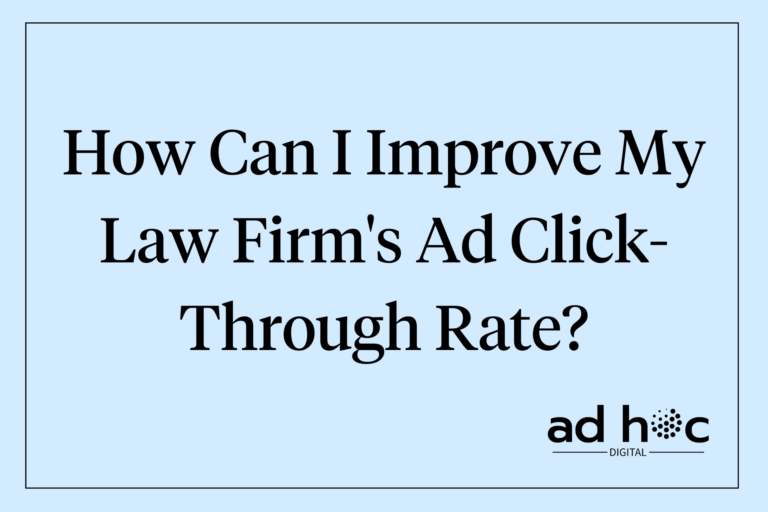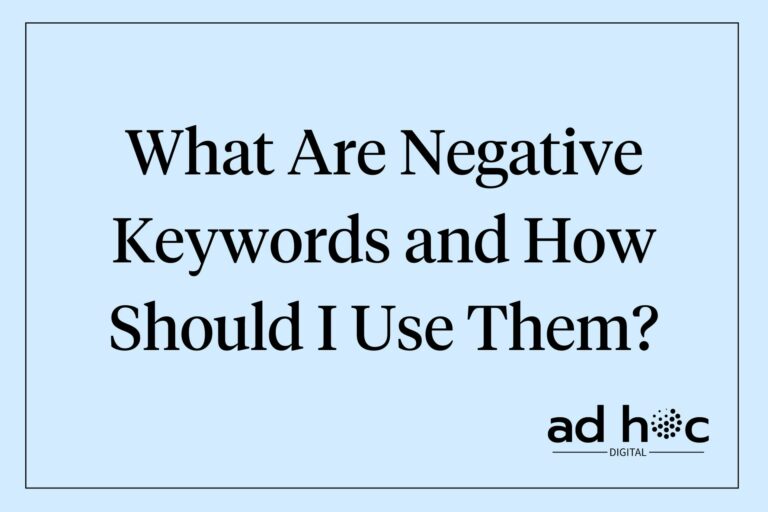Understanding Google Ads for Law Firms
What Are Google Ads for Law Firms?
Google Ads, once known as Google AdWords, is a robust advertising platform that enables you to showcase your law firm’s services to a targeted audience. With over 8.5 billion searches occurring on Google every day, utilizing Google Ads can place your firm directly in front of individuals actively seeking legal services.
Operating on a pay-per-click (PPC) model, Google Ads allows you to pay solely for the clicks your ads receive, not just for showing your ad. This model helps make sure that your marketing budget is spent efficiently, as you are essentially only purchasing traffic that is relevant to your law firm’s offerings. When you get started with Google Ads, you’ll be able to select specific keywords related to your services and create engaging ads that prompt potential clients to take action.
What Are The Benefits of Google Ads?
The benefits of leveraging Google Ads for your law firm are multifaceted. Here’s a snapshot of the key advantages:
-
- Targeted Advertising Approach: Google Ads allows you to display ads based on the keywords and search terms your potential clients are using, ensuring that your message reaches those who are already interested in legal services similar to what you offer.
-
- Specific Geographic Targeting: You can customize your ad campaigns to appear in specific geographic locations, which is particularly beneficial if your law firm caters to clients in certain cities or regions. More information on location targeting for Google Ads for lawyers can be found here.
-
- Immediate Visibility: Unlike organic search, which requires a long-term strategy, Google Ads offers instant visibility on search engine results pages (SERPs). Once your ad campaign is set up and approved, your ads can start attracting clicks and potential clients right away. Some of our clients in the past have received results as fast as 1 – 3 days from launch.
-
- Transparent ROI Tracking: Google Ads provides in-depth tracking and analytics, allowing you to measure the performance of your campaigns and make data-driven decisions. This is quite different when compared to other advertising platforms, like television or radio where it is a bit more difficult to directly attribute the ROI. If you want to learn more I recommend you check out or articles on tracking Google Ads performance for lawyers and measuring the ROI of Google Ads for lawyers.
-
- Budget Control: You have full control over your advertising spend, enabling you to start small and scale up as you see fit. Normally we recommend clients start of with a small budget, and once they establish a proof of concept, scale up as much as they are comfortable with. We dive deeper into this in our article on Google Ads budget for lawyers.
By understanding these benefits, you can make informed decisions about how to best utilize this powerful advertising tool. With the right strategies in place, Google Ads can be an integral component of your law firm’s marketing efforts, and it is one of the key pillars that we recommend most law firms implement into their approach.
Key Strategies for Google Ads Success
To harness the full potential of google ads for your firm, you must adopt a strategic approach. Here are some essential strategies to consider for achieving success with Google Ads:
Targeted & High Intent Approach
Targeted marketing is a cornerstone of effective Google Ads campaigns. Ideally, you want your ads to be seen only by potential clients who are actively seeking legal services. Google Ads offers sophisticated targeting options, including geographic targeting (geotargeting in google ads for lawyers), device targeting (optimizing google ads for mobile law firm), and audience demographics.
Unfortunately there isn’t a one size fits all approach for this. The best way to do this is to truly put yourself in the shoes of your clients and think how they think. For example if you know most of your clients fall into a particular income bracket, you can narrow your targetting to only include them. We do this with estate planning and family law campaigns often, as financially qualified leads can be difficult to come by for some of these firms. Also with this same example, targetting zip codes in more affluent areas has really helped our results.
With device targetting an excellent example is for car accident attorneys. A lot of the time when people need a lawyer for an accident, they want to call as soon as possible. Because of this, we sometimes make it so that our ads only show up on mobile, because in some circumstances our costs per case have been significantly higher on desktop.
You shoula also use these targeting options with respects to the keywords you implement and the ads you create. We normally use our ‘behavioural trigger approach’ to tailor our client’s campaigns to only target individuals who are most likely to need their services. This precision helps in maximizing your budget and improving your campaigns’ overall effectiveness.
Keyword Research
Keyword research is a crucial step in setting up your Google Ads campaigns. By identifying the terms and phrases your potential clients are using in their searches, you can bid on those keywords and improve your chances of appearing in the search results.
We recommend using tools like Google Ads Keyword Planner, Ahrefs, SEMRush, and Moz Keyword Explorer to discover valuable keywords related to your legal services, though most of the time we purely stick to the simple Google Ads Keyword Planner. This is because it makes complete sense that Google is going to have the best data about users on their platform.
You should consider the search volume and competition for these keywords, and prioritize those with high relevance and a ‘reasonable’ cost-per-click (cost per click for legal keywords in google ads).
| Keyword | Average Monthly Searches | Competition | Suggested Bid |
|---|---|---|---|
| Personal Injury Attorney | 10,000 | High | $50.00 |
| Car Accident Lawyer | 6,000 | Medium | $30.00 |
| Best Car Accident Lawyer | 5,000 | Low | $20.00 |
Looking at the table above, a generic example we can see that often times longer search terms have less competition, and sometimes have lower costs associated. This doesn’t necessarily mean that they are the only keywords you should be targetting though, because a lot of the time the higher cost exists for a reason. Occasionally though, if you know what you’re doing, you can find ‘diamonds in the rough’ and really capitalize on a keyword that is being neglected by your market. We always aim to find these, especially for our clients with smaller budgets, as we often have to find ways to get creative and make the most out of every dollar.
There’s a reason why our clients say this:“ He treats our advertising budget like his own money in looking at the types of campaigns we should do.”
You can also use strategies like Single Keyword Ad Groups (SKAGs) to increase ad relevance and Quality Score, which lead to better ad placement and cost savings. Regularly refining your keyword list with additions and exclusions, such as using negative keywords, will further sharpen your targeting and enhance your campaign’s performance.
Negatives are super important for all law firm’s campaigns. We have noticed that many firms waste hundreds if not thousands of dollars every month on keywords that never had any potential at all. This is why we have a huge list of negatives with over 5000 words that we implement for our clients before we even go live with their campaign.
The Importance of PPC Expertise
Pay-Per-Click (PPC) advertising is the model that powers Google Ads, where you pay a fee each time your ad is clicked. Acquiring PPC expertise is essential for creating and managing effective campaigns. Familiarizing yourself with Google Ads’ interface and features, understand bidding strategies, and learning how to analyze campaign performance is mandatory.
If you’re new to Google Ads or don’t have the time to become an expert, consider the benefits of using a google ads specialist for lawyers. A specialist will bring the necessary experience and knowledge to manage your campaigns efficiently, target the right audience, and optimize your ad spend for the best returns.
The last thing you want to do is to spend money on advertising, and lose it all due to lack of experience.
By mastering PPC, targeting your marketing efforts, and conducting thorough keyword research, you’ll be well-equipped to create Google Ads campaigns that can attract more clients to your law firm. Don’t forget to continuously monitor and tweak your strategies once you have enough data to make informed decisions.
How to Implement Google Ads for Your Law Firm
Leveraging Google Ads can be a game-changer for your law firm. Here’s how to set up your campaigns, create optimized ad copy, and track your results for success.
How to Set Up Your Campaign on Google Ads
To begin with your Google Ads journey, you’ll start by setting up your campaign—a crucial step that lays the foundation for your advertising efforts. Consider the following as you embark on this process:
-
- Define clear objectives for your campaign, such as generating leads, phone calls, or driving traffic to your website. For most firms it is generating leads and phone calls.
-
- Select the geographical area where you want your ads to appear. This could be as broad as a country or as specific as a zip code, which is particularly important for local firms (location targeting for google ads lawyers). We recommend starting narrow and then broadening the region if needed.
-
- Choose the right keywords that potential clients might use to search for your services. If you want to learn more about this, read our article on the best keywords for law firm Google Ads.
For a step-by-step guide on the initial setup, visit the article we wrote on getting started with google ads for lawyers.
How to Optimize Your Law Firm’s Ad Copy
Your ad copy is the voice of your law firm online, and it needs to resonate with your audience. Here’s how we recommend you fine-tune your ad copy:
-
- Use clear and concise language that speaks directly to the needs and pain points of your potential clients.
-
- Include a strong call-to-action (CTA) that encourages prospects to contact your firm or learn more about your services.
-
- Implement Dynamic Keyword Insertion (DKI) to make your ads more relevant to a searcher’s query, potentially improving your click-through rate and conversion rate. This can work extremely well if done correctly, but it requires a very refined process. Internally we use our ‘behavioural trigger approach’ which gets our clients the best results out of any method we have tried, but prior to working with us many of them actually had unprofitable ads. What this shows is that even if you have the right idea, if the execution isn’t there, then it simply won’t work.
For insights on creating compelling ad copy, check out the article we wrote on effective google ads campaigns for lawyers.
How to Track and Interpet Analytics
To ensure your Google Ads campaigns are performing optimally, you must track and analyze a variety of metrics:
-
- Monitor your campaigns’ click-through rates (CTRs) and conversion rates to gauge user engagement and the effectiveness of your ad copy.
-
- Keep an eye on your cost-per-action (CPA) to determine the cost-effectiveness of your campaigns.
-
- Regularly review the Search Terms Report to discover new, relevant keywords that can help you refine your campaigns.
-
- Ultimately look at the return on your investment. Every other metric is just a secondary metric. The primary metric, and your north star should be your ROI. We typically aim for a 3x ROI as a minimum and then reverse engineer the rest of the process so that we can set KPI’s and minimum benchmarks so that we can clearly see whether a campaign will be profitable or not. Unfortunately many companies work the other way around and set bench marks for everything first, then ROI last…
To further explore tracking and analytics, check out: using analytics with google ads for lawyers.
How to Maximize ROI with Google Ads
Here’s a few ways in which you can work to maximize your ROI:
Utilizing the Search Terms Report
The Search Terms Report is an invaluable resource to understand how potential clients are searching for legal services. It reveals the exact phrases and language used by searchers, providing insights that can lead to the creation of new ad groups or campaigns tailored to these specific queries. By aligning your ads more closely with client intent, you increase the chances of conversion.
It is impossible to predict what people are going to search accurately. It is sometimes hilarious looking at how wrong our predictions were because people can search in such peculiar ways. For example, if I was to search for a car accident lawyer I would never search ‘accident wreck lawyer in Vegas best’, but this is a term that we actually saw in one of our clients accounts multiple times.
Utilize the insights from the Search Terms Report to refine your keyword strategy, enhance targeting, and ensure that your ads appear for the most relevant searches. This targeted approach can optimize your budget and boost your ROI.
Improving Ad Performance
Enhancing the performance of your ads is crucial for maximizing ROI. This includes updating ad copy and landing pages to match the search intent as identified in the Search Terms Report. By doing so, you not only increase ad relevance but also improve your Google Ads Quality Score.
A higher Quality Score can lead to reduced cost-per-click (CPC), improved click-through rates (CTR), and increased conversions. Regularly reviewing and refining your ad copy based on performance data is essential. Take advantage of A/B experiments to determine the most effective messaging for your audience.
For more on how to improve your ad performance, explore our guide on improving Google Ads CTR for law firms.
Optimizing Your Budget
Budget optimization is key to getting the most out of your Google Ads investment. It’s not just about how much you spend, but how you allocate your funds across campaigns, ad groups, and keywords. Focus on high-performing keywords and consider using automated bidding strategies to adjust bids in real-time based on the likelihood of conversion (We like using max conversions).
Keep an eye on your google ads budget to ensure you’re not overspending in areas with lower returns. Regularly review CPCs and adjust your bids to maintain a balance between visibility and cost-efficiency. Use negative keywords to prevent your ads from showing up for irrelevant searches, thereby saving your budget for more qualified leads.
By implementing these strategies, you can enhance the effectiveness of your Google Ads campaigns, leading to a higher ROI. Remember, success with Google Ads doesn’t happen overnight. It requires ongoing management, analysis, and refinement.
If you liked what you read I encourage you to subscribe to our newsletter below. We have a lot of valuable resources which we send out every week. Also, if you’re interested in learning more about what we do just fill out the form at the bottom of this page and we’ll be in touch with you shortly.



